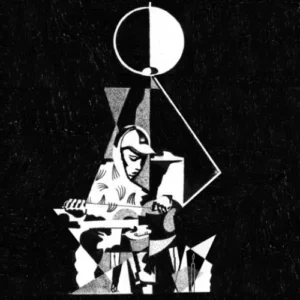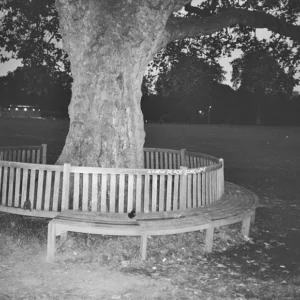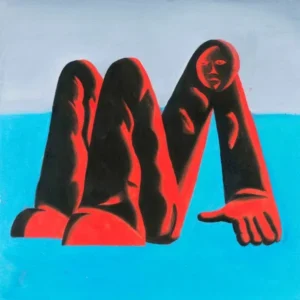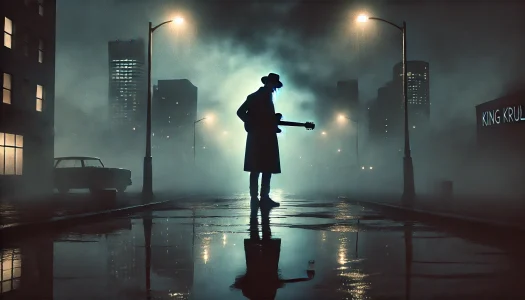King Krule, born Archy Marshall, is an artist who defies easy categorization. With his gravelly voice, brooding lyricism, and genre-fluid sound, he has carved out a distinct niche in the music world. Whether he’s blending post-punk grit with jazzy undertones or layering murky electronic beats with darkwave energy, King Krule’s music feels like a late-night urban odyssey—a sonic journey through dimly lit streets, tinged with melancholy and introspection.
Background: The Roots of King Krule’s Sound
Early Life
Archy Ivan Marshall was born on August 24, 1994, in South London, a city that would heavily shape both his worldview and his music. Raised in the multicultural melting pot of East Dulwich, Marshall was exposed to a diverse range of sounds, from reggae blasting in the streets to the jazz and punk records his parents played at home. His upbringing wasn’t without its challenges—Marshall has spoken openly about struggling with mental health and feeling like an outsider during his school years.
He attended the BRIT School, an institution known for nurturing raw artistic talent (alumni include Adele and Amy Winehouse), but even there, he often felt alienated from his peers. Yet, it was in these moments of isolation that his creative instincts began to take root.
Musical Beginnings
Marshall began creating music as a teenager, initially under the moniker Zoo Kid, a nod to his early fascination with the natural world and his sense of feeling like an outsider looking in. His early work already displayed the traits that would define his later music: murky, atmospheric production, haunting vocals, and a deeply personal narrative style. In 2011, he rebranded as King Krule—a name that added a royal gravitas to his raw, gritty persona—and released his breakout single “Out Getting Ribs.” Written when he was just 16, the song introduced audiences to his unmistakable, gravelly voice and raw emotional depth, quickly earning him a cult following.
Artistic Influences
Marshall’s sound is a patchwork of eclectic influences, with genres like punk, jazz, hip-hop, and dub all feeding into the unique sonic world of King Krule. He cites artists like The Clash and The Libertines as early influences, particularly their gritty portrayal of urban life. Jazz is another vital component of his music, with his love for artists like Chet Baker and Miles Davis reflected in the moody, improvisational qualities of his songs. The melancholic undercurrents in his music also owe something to British post-punk and darkwave, with bands like Joy Division and The Cure shaping his atmospheric and often bleak soundscapes.
Beyond these musical touchpoints, King Krule’s work is deeply influenced by the geography and mood of South London itself. The grey skies, council estates, and nocturnal streets of his hometown seep into his music, giving it a stark urban poetry that feels both intimate and cinematic. His genre-bending approach makes him hard to pin down, but that fluidity is exactly what makes him so compelling. In blending these diverse styles, King Krule has crafted a sound that feels entirely his own—a reflection of his internal chaos and the world around him.
Discography Overview
1. 6 Feet Beneath the Moon (2013)

King Krule’s debut album, 6 Feet Beneath the Moon, established Archy Marshall as a singular voice in the alternative music scene. Released on his 19th birthday, the record is a haunting blend of jazz, punk, and trip-hop, reflecting the restless energy of a young artist grappling with urban alienation. Tracks like “Easy Easy” and “Out Getting Ribs” showcase Marshall’s gravelly baritone and sparse, hypnotic arrangements, while songs like “Baby Blue” reveal a more vulnerable, introspective side.
The album’s title itself hints at the recurring themes of isolation, death, and emotional depth that pervade the record, all underscored by a raw, youthful intensity. 6 Feet Beneath the Moon doesn’t follow traditional song structures but instead unfolds like a stream of consciousness—gritty, disjointed, and deeply atmospheric.
2. A New Place 2 Drown (2015)

Though not released under the King Krule name, A New Place 2 Drown is a vital part of Archy Marshall’s discography. The project, a multimedia collaboration with his brother Jack, included an album, a book of poetry and artwork, and a short film. Musically, it marked a departure from the guitar-driven sound of his debut, embracing more electronic and hip-hop elements.
The record is a moody, ambient soundscape that leans into lo-fi beats and atmospheric textures, allowing Marshall’s vocals to melt into the production. Tracks like “Any God of Yours” and “Thames Water” evoke an eerie sense of detachment, reflecting the album’s exploration of loneliness and urban decay. This project helped solidify Marshall’s reputation as an artist willing to push boundaries and experiment with new sonic palettes.
3. The Ooz (2017)

The Ooz is perhaps King Krule’s most expansive and ambitious work. Clocking in at nearly 70 minutes, the album is a sprawling exploration of the human psyche, where anxiety, depression, and the surrealities of everyday life all converge. Sonically, it’s a melting pot of jazz, punk, dub, and even elements of psych-rock, creating a deeply atmospheric world that feels both claustrophobic and endlessly expansive.
The title itself refers to an idea of the “ooze” being everything that seeps out of you—the thoughts, feelings, and experiences you can’t contain. Songs like “Dum Surfer” and “Half Man Half Shark” showcase King Krule’s knack for crafting hypnotic, dystopian soundscapes, while tracks like “Biscuit Town” and “Czech One” delve into more introspective territory. The Ooz is both chaotic and meticulously crafted, reflecting Marshall’s growing maturity as a songwriter and his ability to translate emotional complexity into his music.
4. Man Alive! (2020)

Man Alive! builds on the darker themes of The Ooz but presents them in a more refined, cohesive manner. Released in the backdrop of personal upheaval and global uncertainty, this album continues to explore themes of isolation, mental health, and existential dread, but with a heightened sense of urgency. Tracks like “Comet Face” and “Cellular” feature Marshall’s signature genre-blurring style, incorporating post-punk, jazz, and experimental hip-hop, but with a sharper, more focused edge.
One of the album’s highlights, “Alone, Omen 3,” offers a rare moment of hope, suggesting that even in the midst of chaos, there’s still a possibility for connection and healing. Man Alive! feels more concise and tightly structured than its predecessors, reflecting an artist who has honed his craft without losing the raw, emotional undercurrent that defines his music.
5. Space Heavy (2023)

King Krule’s most recent album, Space Heavy, is an exploration of the space between places—both physical and emotional. Written over the course of two years while Marshall was commuting between London and Liverpool, the album is a reflection on disconnection, longing, and the liminal spaces we find ourselves in. Sonically, Space Heavy is perhaps his most ethereal work to date, leaning into dreamy synths, soft guitars, and subdued rhythms that create a sense of floating through space.
Tracks like “Seaforth” and “Pink Shell” embody this dreamy, melancholic quality, while songs like “If Only It Was Warmth” tap into the familiar themes of heartache and existential reflection. Though it retains the genre-blending essence of King Krule’s earlier work, Space Heavy feels like a more contemplative and restrained album, as if Marshall is exploring the quiet spaces between the chaos.
Industry Perspective
Challenges and Triumphs
Despite the critical acclaim that Archy Marshall (King Krule) has garnered over the years, his career has not been without its struggles. One of his most persistent challenges has been his battle with mental health, which he has openly discussed in interviews. Marshall has often described feeling overwhelmed by fame, dealing with bouts of anxiety and depression, and grappling with a sense of alienation both personally and professionally. These internal struggles have deeply influenced his music, but they’ve also made the pressures of the music industry more intense.
Another hurdle has been his refusal to conform to commercial expectations. King Krule’s genre-defying music doesn’t easily fit into radio formats or mainstream playlists, and he’s never aimed for the kind of chart-topping success that many artists chase. His work is gritty, abstract, and often bleak—qualities that don’t align with the polished, marketable sounds often favored by the industry. Yet, this uncompromising approach has also been one of his greatest strengths. Marshall has remained fiercely true to his vision, winning over a dedicated fanbase that respects his authenticity and artistry.
Triumphs for King Krule have been largely rooted in his ability to resonate with listeners on a deeply emotional level. His albums, particularly The Ooz and Man Alive!, have garnered critical praise for their depth and complexity, solidifying his position as one of the most innovative voices in alternative music. While commercial success hasn’t been the driving force of his career, his ability to maintain artistic integrity while continuously evolving musically is a victory in its own right.
Collaborations and Connections
Throughout his career, King Krule has been part of a creative community that values experimentation and collaboration. One of his most notable connections is with his brother, Jack Marshall, with whom he collaborated on A New Place 2 Drown. The multimedia project not only showcased their shared vision but also blurred the lines between visual art, poetry, and music. This collaboration speaks to Marshall’s broader artistic sensibilities and his willingness to transcend traditional boundaries between mediums.
King Krule has also worked with a range of musicians across different genres, further reflecting his eclectic approach to music. In 2019, he collaborated with American jazz musician Kamasi Washington on a track called “Peals of Thunder” for the Rough Trade Counter Culture compilation, blending his signature dark, atmospheric sound with Washington’s expansive jazz influence. Another significant collaboration was with British electronic artist Mount Kimbie, featuring on their 2017 track “Blue Train Lines,” where his unmistakable voice injected raw emotion into the duo’s minimalist production.
These collaborations highlight Marshall’s versatility and his willingness to engage with other creative minds without losing his own unique sound. His connections with artists in the jazz, electronic, and visual arts worlds have enriched his work, allowing him to explore new sonic territories and expand the emotional range of his music.
Recognition and Achievements
While King Krule hasn’t pursued mainstream success in a conventional sense, his work has not gone unnoticed by the industry or critics. His debut album 6 Feet Beneath the Moon was met with widespread acclaim, landing on multiple year-end lists from publications like Pitchfork and NME, and marking him as one of the most promising new artists of the 2010s.
His follow-up, The Ooz, solidified his status as an avant-garde force in modern music, earning him a nomination for the prestigious Mercury Prize in 2018, which recognizes the best British albums of the year. Though he didn’t win, the nomination itself was a testament to his growing influence and the album’s critical success. The Ooz also appeared on numerous critics’ “best of the year” lists, further establishing him as a boundary-pushing artist.
Man Alive! continued this trajectory, receiving strong reviews and further cementing his reputation as a master of moody, genre-bending music. Additionally, Marshall’s visual and musical contributions to culture have been recognized in various artistic circles, with his multimedia projects like A New Place 2 Drown gaining praise for their innovation.
Impact and Legacy
Cultural Significance
King Krule has left an indelible mark on modern music, particularly within the realms of alternative, indie, and experimental genres. His ability to blend disparate influences—post-punk, jazz, hip-hop, dub, and more—into a cohesive, deeply personal sound has positioned him as a trailblazer in genre-fluid music. By rejecting traditional genre constraints, Archy Marshall has paved the way for a new generation of artists who prioritize emotional authenticity and sonic exploration over commercial appeal.
Marshall’s gritty, atmospheric soundscapes and raw, introspective lyrics resonate deeply with the disillusioned youth of today, capturing the anxiety, alienation, and existential dread that defines much of contemporary life. His portrayal of urban decay, mental health struggles, and modern-day malaise has created a cultural footprint that feels authentic and unfiltered, giving voice to experiences that are often marginalized or overlooked in mainstream music. In this sense, King Krule has not only contributed to the evolution of alternative music but has also become a symbol of resilience and artistic integrity in an industry that often prioritizes commercial success over creative depth.
His influence extends beyond his own music; he has inspired artists across genres who are drawn to his unique ability to create immersive, emotionally charged soundscapes. Artists like Fontaines D.C., Slowthai, and even Billie Eilish have cited Marshall as an influence, acknowledging the way he merges lo-fi aesthetics with raw, powerful emotion. In blending genres so effortlessly and sincerely, King Krule has helped redefine the boundaries of alternative music, pushing it into new, often darker emotional and sonic territories.
Fanbase and Community
King Krule’s fanbase is as eclectic and diverse as his music. His listeners are drawn to his vulnerability, his unfiltered reflections on mental health, and the deeply personal stories he weaves into his songs. His music resonates with those who feel out of step with society, creating a sense of community among fans who find solace in his cathartic soundscapes. For many, Marshall’s music serves as a lifeline—an outlet for processing feelings of loneliness, alienation, and uncertainty.
Despite his relatively low-key presence on social media and in the public eye, King Krule has fostered a dedicated and tight-knit community around his work. His concerts are immersive experiences where fans connect not only with the music but with each other, creating a shared space for introspection and release. There’s a palpable sense of intimacy between King Krule and his audience, rooted in the honesty of his music and his refusal to conform to mainstream trends.
His openness about mental health has also strengthened the connection with his fanbase. By speaking candidly about his own struggles, Marshall has helped destigmatize conversations about anxiety, depression, and existential angst—issues that resonate deeply with many of his listeners. This emotional transparency has built a bond of trust between King Krule and his fans, making his music not just a listening experience but an emotional refuge.
Looking Forward
As King Krule continues to evolve, the future of his career seems ripe with possibilities. His most recent album, Space Heavy, showcases a more contemplative and restrained approach to his music, hinting at an artist who is still pushing himself creatively while refining his sound. It’s clear that Marshall is not content to stay in one musical lane, and his willingness to experiment with new sonic landscapes suggests that his future projects will continue to surprise and challenge both himself and his audience.
Looking ahead, it’s likely that King Krule will remain a deeply influential figure in the alternative music world. As more artists embrace genre fluidity and emotional honesty, his impact will only grow. His music has already inspired a generation of up-and-coming musicians who view him as a pioneer of sound that transcends conventional labels, and this influence is poised to deepen as he continues to release new work.
Closing Thoughts
King Krule stands as one of the most original and boundary-pushing artists of his generation. His music defies easy categorization, but that’s precisely what makes it so compelling. By blending genres as diverse as jazz, post-punk, hip-hop, and electronica, he has crafted a sound that is entirely his own—an emotive, atmospheric world that draws listeners in and refuses to let them go. Through his unflinching exploration of themes like isolation, mental health, and urban decay, Archy Marshall creates music that speaks to the rawest parts of the human experience, resonating deeply with those who feel out of step with the world.
Despite the challenges he’s faced—both personal and professional—Marshall has remained steadfast in his artistic vision, continuously pushing the boundaries of what his music can express. His ability to convey such vulnerability and emotional complexity through his art is a rare gift, and it makes him deserving of far more attention than he currently receives in the broader music landscape. For those who appreciate raw emotion, innovative soundscapes, and an uncompromising commitment to creativity, King Krule offers a musical journey unlike any other.
